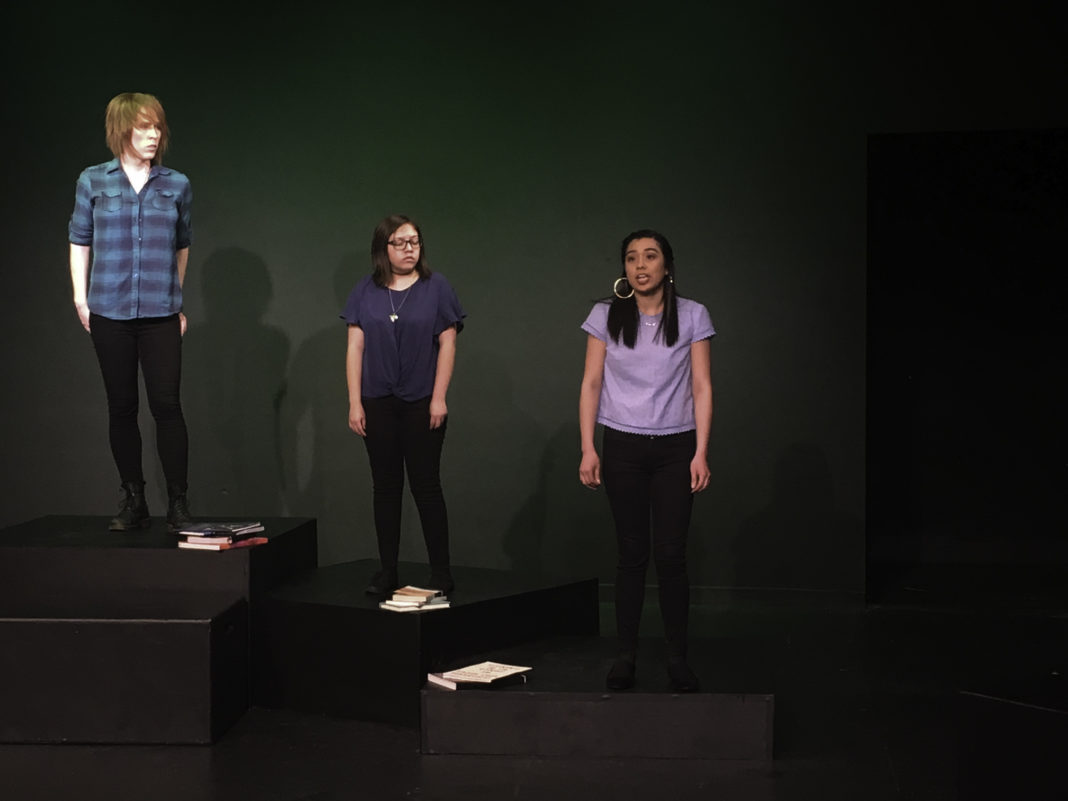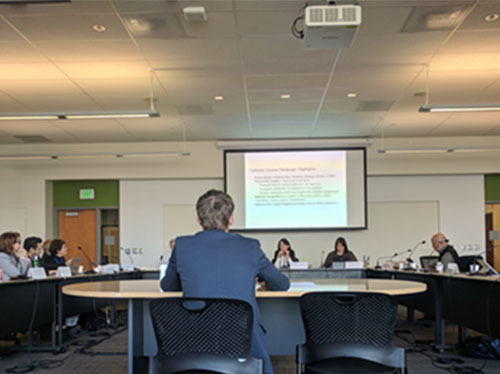Three women sat on platforms of various heights, breathing for a few moments, building suspense in the silence until six words filled Portland State’s Studio Theater in Lincoln Hall: Let Me Tell You a Story. The play, which opened on Thursday, April 12, was part of John Fraire’s Performance as Education program, which engages students in theater arts as a means to learn and to teach their audiences in turn.
The three women who starred in Let Me Tell You a Story—Mallory Hawke, Lindsay Romo and Ibette Sanchez-Mexicano—were all first-time performers; Romo and Sanchez-Mexicano are social work majors, and Hawke studies biology.
The concept for the play was born out of storytelling seeds planted by the three performers in their online applications for the PAE program. “[The application asked] ‘Why do you want to do this?’ and a battery of essay questions,” Hawke said. “The answers were taken apart piece by piece [by director Leslie Irene Gale], and our piecemeal responses were altered over a several-month process.”
In the resulting play, Hawke, Romo and Sanchez-Mexicano wove a web of stories about their experiences of womanhood, building layers on one another’s stories with interjections of their individual, but overlapping, experiences. The women spoke of the movies from which they learned constructions of femaleness—Matilda, Mad Max, Disney princess movies—and their experiences of sexual harassment on buses and trains. The ensemble narrative touched on mental illness, parental expectations and avoiding the label bitch.
Romo and Sanchez-Mexicano emphasized the struggles of womanhood while growing up in Latinx households with strict cultural expectations of who women ought to be. “The experience…really allowed me to gain power back about some of the hardest experiences I have had as a Chicana,” Sanchez-Mexicano said.
Hawke reflected on her journey as a transgender woman, highlighting how many women take femaleness for granted, while even the everyday act of going to the restroom presents challenges for her. “When I hear a mother come in with children,” she said onstage before pulling up imaginary jeans, “I wait for them to leave.”
As they spoke, the performers walked around in circles and sat or stood on different platforms in various formations bathed in alternating hues of blue, green and purple light. The lighting and choreographed movements reflected the complex and mercurial colors of womanhood.
“Screw writing strong women,” said Romo, quoting a phrase she’d read online. “Write interesting women.” The performers listed all the adjectives a woman could be, including what they are told to be and what they are told not to be. Using the collection of feminist books on stage such as Chimamanda Ngozi Adichie’s We Should All Be Feminists, the women defined feminism in its various forms and movements. From the first wave of feminism to the fourth, from intersectional feminism to cultural feminism to ecofeminism. “Sounds like there are about as many types of feminism as there are women in this world,” Sanchez-Mexicano said onstage.
“We all had to rely on [each] other in order to get where we needed to be for the final production,” Romo said. “Without each other and working so hard together, we would not have Let Me Tell You A Story.”
After the performance, audience members asked questions including what advice they would give to their younger selves. “I would tell myself that men are trash, and that’s never gonna change,” said Sanchez-Mexicano.
Hawke advised her 23-year-old self to invest all her money in Bitcoin, and her 12-year-old self to “be honest with her parents about how she felt about herself and her body and the pain she was going through, because they love her.”
“I consider myself a 36-year expert in being a woman,” director Gale said, “and I learned so much from these ladies.”
The play’s sibling production, FUBAR We’re Still Here, will tell veterans’ stories in a free event at 7 p.m. on April 19, 20 and 21, and at 2 p.m. April 21 in Lincoln Hall’s Studio Theater.






